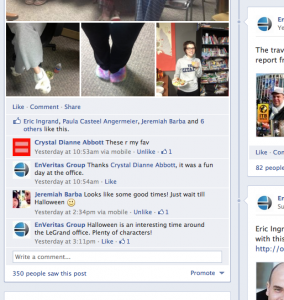5 Tips for Optimizing Facebook’s Graph Search for Marketing
Anytime a major social media brand rolls out a new product, businesses take note. This time, the response is warranted. Facebook’s Graph Search has the potential to be an enormous tool for businesses, particularly small businesses with a tight budget. With unparalleled access to your market’s likes, as noted on Facebook, hold off on hiring that survey company to search out information for you. Most of what you want to know will be right at your fingertips.

So what shows up in a Graph Search result? So far, the topics included are people, places, and things: photos, restaurants, cities, music, games, and businesses. Once you have performed a search (the search tool will guide you in wording your search to achieve the best results), you will see a list of results with an image (when provided) by each. Information you might see in a result includes your company name, business type, number of stars (as rated by your fans), address, check-ins or active users, likes, hours of operation, contact information, description, and additional pages liked by your fans.
Why is this important? Because in many ways, you have control over what is displayed here, and by doing a few extra things, you can increase your visibility in Graph Search. Here are five tips that you can use to optimize Facebook’s Graph Search for your company’s marketing efforts:
1. Create a Facebook page for your business
This seems obvious, but I’m amazed by how many small businesses overlook this. Without a Facebook page, you will not be displayed in Graph Search at all, so this is the first step. Here’s the catch though: Be sure to set up a business page and not a personal profile. Not sure about the difference? Read this article.
Now that you’re an expert on the difference between a page and a profile, let’s move forward. I know that time is precious, and you may find it difficult to devote time to what seem like “extras,” but taking several hours to do this work can increase inbound leads significantly and help you reach additional markets. If you truly don’t have time, pay or barter with a college student! They have the knowledge and most are always looking for some extra cash.
2. Add as much information about your business as possible
Again, not to be obvious, but take advantage of every opportunity to get your information out there. Be sure to fill out every piece of available information on your Facebook page. Write a compelling description of your business, add the type of services, price range, payment options, contact information, parking options…you get the idea. This information can all be displayed in Graph Search. While it may not actually make you rank higher, many times the amount and variety of data displayed in your search result is reason enough for someone to choose your page over others.
3. Engage your fans
Graph Search will account for the activity on your page (i.e. likes, share, comments). If your page is stagnant, that will work against your appearance in search results. So many companies make the mistake of posting about themselves without ever engaging their fans. When fans like or share your page and content, your page is viewed as more relevant to the search engine. This increases your chances of ranking for searches.
 I can’t tell you how many businesses I support simply because of a good experience with their social media site. About a year ago, I was distraught because our home Internet had stopped working again. This was about the fourth time in a month — a real problem for me because I work from home. In frustration, I pulled out my smartphone, got on social media, and expressed my dissatisfaction with the company that supplies our Internet service. Within a few minutes, a representative from that company responded to me and offered her help.
I can’t tell you how many businesses I support simply because of a good experience with their social media site. About a year ago, I was distraught because our home Internet had stopped working again. This was about the fourth time in a month — a real problem for me because I work from home. In frustration, I pulled out my smartphone, got on social media, and expressed my dissatisfaction with the company that supplies our Internet service. Within a few minutes, a representative from that company responded to me and offered her help.
We took our conversation offline and she had the issue resolved quickly. I have never been more impressed with a company’s social media team. I have heard it said that most people now expect to be able to get customer service help on social media. Listen to what your fans have to say, answer their questions. They will remember and your business will most likely gain a boost in reputation. If it’s in your budget, use a software like Radian6 to monitor what’s being said about your business and be able to respond quickly.
4. Conduct research to find out how to expand
Don’t let the new format of Graph Search scare you. The best way to learn is to jump in and start searching. In researching Graph Search benefits to small businesses, I took on the mindset of a girl wanting to sell Girl Scout Cookies. Where should I go to get the most business?
I began by searching for “people who like Girl Scout Cookies and live in Greenville, SC.” Now I have a list of people I don’t know, so what next? In the right navigation of the search page, you’ll see parameters you can define (play around with these!). Underneath, I noticed an option to see “more pages they like.” After clicking on that, I see that people in Greenville, SC who like Girl Scout Cookies also like Target, Chick-fil-A, Krispy Kreme, and Walmart, to name a few places. So as a Scout, if I wanted to sell cookies to my ideal market, I might set up a booth at these places. All of that research took about 5 minutes of my time. Imagine the possibilities for you!
5. Create a Foursquare page
I realize this may seem off-topic, but many Facebook business pages link to their Foursquare account. This is important because when your business page shows up in Graph Search, you can show the searcher that his or her friends have checked in at your business. Having this data displayed can prompt people to choose your business over others. It’s just one more reason to click on your link.
Happy Graph Searching
As with any new technological gadget on the Internet, there will always be a learning curve. Get started by using the tips included in this article, but be sure to have a continuous research approach. There will undoubtedly be bumps in the road as the new Graph Search is rolled out, but Facebook will iron those out as things move along. This means the game will change again and again, so be dynamic and change with it. Happy searching to you and your colleagues.
About the Guest Blogger:
Laura Lee – SEO Specialist
Laura Lee has been an SEO Specialist with WebMD for the past 6 years. Her specialties include content management, SEO, SEM, social media, and link development. Prior to that, Laura was an English major and WebMD editorial team contractor.



